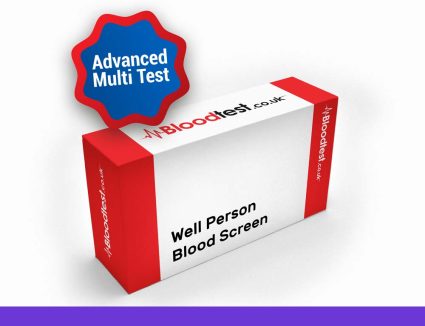Unlocking the Benefits of a Well-Person Blood Test for Proactive Health Management
 A well-person blood test serves as a crucial health evaluation mechanism specifically designed to examine a diverse range of physiological markers. These markers yield vital insights into an individual’s overall health status, playing a significant role in pinpointing potential health issues before they escalate into more serious conditions. Distinct from routine check-ups, this test embodies a proactive and preventive approach to health management. By identifying early indications of diseases, healthcare practitioners can implement timely interventions that greatly enhance health outcomes and improve an individual's quality of life.
A well-person blood test serves as a crucial health evaluation mechanism specifically designed to examine a diverse range of physiological markers. These markers yield vital insights into an individual’s overall health status, playing a significant role in pinpointing potential health issues before they escalate into more serious conditions. Distinct from routine check-ups, this test embodies a proactive and preventive approach to health management. By identifying early indications of diseases, healthcare practitioners can implement timely interventions that greatly enhance health outcomes and improve an individual's quality of life.
The benefits associated with undergoing a well-person blood test in Newbury are extensive and multifaceted. Early detection of health issues can prevent the onset of chronic conditions such as diabetes, heart disease, and various forms of cancer. This proactive strategy not only promotes better health management but also empowers individuals to make educated lifestyle decisions. Gaining awareness of one’s health status inspires individuals to take control of their well-being, fostering a proactive attitude towards health maintenance and improvements in lifestyle choices.
Adults over the age of 40, or those with a familial history of specific health conditions, are often advised to engage in these essential tests. Nevertheless, even younger adults who show no visible symptoms can experience significant advantages from routine screenings. For residents in Newbury, the local availability of healthcare providers offering these tests ensures exceptional convenience, allowing individuals to effectively monitor their health markers and proactively address any potential health issues.
Comprehensive Overview of the Well-Person Blood Test
The term ‘well-person blood test’ encompasses a thorough analysis that evaluates a variety of health markers present in the bloodstream. These markers typically include cholesterol levels, blood sugar levels, liver function tests, and assessments of renal function, all of which are paramount for providing a holistic perspective on an individual’s health. This type of testing proves particularly beneficial for identifying conditions that may not exhibit symptoms initially, thus facilitating timely medical intervention and treatment.
Well-person blood tests represent a cornerstone of preventative healthcare, enabling individuals to adopt a proactive rather than reactive stance towards their health. Through this exhaustive assessment, healthcare providers can identify any irregularities that may require further exploration, effectively establishing a forward-thinking strategy for managing health risks and optimising well-being.
In contrast to diagnostic testing, which is usually conducted when a specific illness is suspected, the well-person blood test prioritises health assessment over disease confirmation. This distinction renders it an invaluable resource for anyone keen to sustain optimal health and personal wellness throughout their lives.
Uncovering the Major Benefits of Regular Health Testing

Participating in a well-person blood test in Newbury presents a plethora of benefits, particularly concerning the early identification and effective management of health risks. One of the primary advantages lies in the identification of potential health threats long before any symptoms manifest. For example, elevated cholesterol levels may indicate a risk for cardiovascular disease, prompting necessary lifestyle modifications or medical interventions to mitigate these risks effectively.
Moreover, these tests serve as a benchmark for comparisons in future health assessments. By consistently tracking key health markers, individuals can observe trends over time, identifying changes that may warrant further attention. This historical data proves invaluable during consultations with healthcare providers, fostering a more informed approach to personal health strategies and interventions that align with individual needs.
Additionally, individuals undergoing these evaluations frequently report a heightened sense of tranquillity. Knowing that they have proactively taken steps to monitor their health can alleviate anxiety regarding potential health issues. This mental aspect of well-being is crucial, as it significantly influences overall health management and promotes a balanced lifestyle.
Determining Who Should Consider a Well-Person Blood Test
While anyone can benefit from a well-person blood test in Newbury, certain demographics are particularly encouraged to participate. Adults aged 40 and above are often advised to engage in regular screenings, given that the probability of developing chronic illnesses tends to rise with age. Additionally, individuals with a family history of conditions such as diabetes, heart disease, or high blood pressure should make it a priority to incorporate these tests into their routine health monitoring practices.
Even younger individuals who do not exhibit visible symptoms can derive significant insights from these assessments. Early testing provides critical information that can guide healthier lifestyle choices for those wishing to establish a health baseline or for those involved in high-risk behaviours. Embracing a proactive approach is vital for individuals aiming to take control of their health trajectory and prevent future complications.
In Newbury, local healthcare services are readily available to assist individuals in determining when and how frequently they should undergo testing. This ensures that personal and family health histories are carefully considered for optimal health management and personalised care tailored to individual needs.
Choosing the Most Suitable Well-Person Blood Test Facility in Newbury

Finding a facility for your well-person blood test in Newbury is a straightforward process, thanks to the numerous options available within the community. Residents can select from local clinics, private health services, and NHS facilities that offer these essential tests, ensuring a variety of choices to suit different needs and preferences.
Optimising Local Clinics for Your Blood Test Needs
A diverse range of General Practitioner (GP) practices in Newbury provide <a href="https://limitsofstrategy.com/blood-test-for-general-health-a-guide-for-stourbridge-residents/">well-person blood tests</a> as part of their health services. Typically, scheduling one of these tests requires a referral from your GP. During your consultation, your doctor will discuss your health concerns and may recommend specific tests tailored to your unique health profile, ensuring a personalised approach to your health assessment.
These local clinics offer the added advantage of familiarity. Patients are often accustomed to their GP’s methods, facilitating open discussions regarding health histories and concerns. Additionally, the convenience of local clinics streamlines the management of appointments and follow-ups, ultimately enhancing the overall experience for patients seeking health insights.
While NHS facilities provide these tests, availability may vary across practices. Some may prioritise patients based on specific risk factors or medical history, so it is advisable to book in advance and discuss your eligibility during your consultation to ensure timely access to these vital health assessments.
Exploring Enhanced Testing Options at Private Health Services
For individuals seeking quicker and more comprehensive options, private clinics in Newbury offer well-person blood tests with a range of benefits. The primary appeal of private health services lies in the expedited results. Many clinics can provide results within 24-48 hours, allowing patients to swiftly gain insights into their health status and make informed decisions regarding their wellbeing.
Furthermore, private clinics often accommodate a broader array of tests than standard NHS offerings. This flexibility empowers patients to select specific health markers they wish to monitor, leading to a tailored health assessment that addresses individual concerns and requirements. This personalisation enhances the relevance and effectiveness of the health evaluation.
Although the costs associated with these services may exceed NHS tests, the convenience and speed of results can justify the investment, particularly for individuals eager to take proactive measures in managing their health and wellbeing.
Utilising NHS Services for Comprehensive Blood Testing

NHS facilities in Newbury also provide well-person blood tests, although availability may fluctuate depending on local health policies. Typically, these services form part of the broader preventive health measures offered by the NHS, aiming to support the health of the population and enhance overall wellbeing.
Accessing NHS services usually necessitates a visit to your GP, who will assist in determining the necessity for a blood test based on your health history and current health status. While the NHS delivers excellent care, be aware that wait times may exceed those experienced in private clinics; thus, individuals should consider their health needs and timelines when deciding where to undergo testing to ensure timely evaluations.
Essential Guidelines for Preparing for Your Blood Test
Preparation plays a vital role in obtaining accurate results from your well-person blood test in Newbury. Understanding the requirements and protocols can facilitate a seamless testing experience, ensuring that you are well-prepared for your appointment.
Fasting Guidelines for Optimal Test Results
Fasting is often a crucial preparatory step for many blood tests. Depending on the specific tests ordered, you may be required to abstain from consuming anything other than water for 8-12 hours before your appointment. This fasting period is particularly important for tests assessing blood sugar and cholesterol levels, as food intake can temporarily alter these markers, leading to potentially inaccurate results.
It is essential to consult with your healthcare provider regarding specific fasting instructions, as some tests may not require fasting while others do. Being well-informed will ensure that you are properly prepared and can help avoid any need to reschedule your appointment due to improper preparation, ultimately streamlining your health assessment process.
Selecting Comfortable Attire for Your Blood Test Appointment
On the day of your well-person blood test in Newbury, prioritising comfort is crucial. It is advisable to wear loose-fitting clothing that allows easy access to your arms, as blood is typically drawn from a vein in the arm. This consideration can facilitate a smoother process for both the patient and the healthcare professional conducting the test, ensuring an efficient and stress-free experience.
Rolling up your sleeves or opting for short sleeves can enhance comfort, allowing for immediate access during the procedure. Ensuring that you are relaxed and comfortable contributes to a more positive testing experience and can help alleviate any anxiety about the procedure, enhancing your overall well-being during the visit.
Informing Your Healthcare Provider About Medications and Supplements
Before your blood test, it is imperative to inform your healthcare provider about any medications or supplements you are currently taking. Certain medications, particularly those affecting blood sugar or cholesterol levels, can significantly influence the test results. Providing this information enables your healthcare provider to interpret your results accurately and determine whether any adjustments to your medications or supplements are necessary for optimal health management.
In some cases, your healthcare provider may recommend that you temporarily discontinue certain medications before your test. Always adhere to the guidance provided to ensure the most accurate test results possible, thereby enhancing the effectiveness of your health assessment and subsequent treatment plans.
Key Health Markers Evaluated During Your Blood Test
The well-person blood test in Newbury assesses various health markers, providing a comprehensive overview of your physiological condition. Understanding what these tests measure can empower individuals to make informed decisions regarding their health and wellness.
Identifying Common Health Markers Evaluated in Your Blood Test
Typically, the tests included in a well-person blood test evaluate cholesterol levels, blood sugar levels, liver function, kidney function, and thyroid hormones. Each of these markers provides critical insights into different aspects of one’s health and well-being.
For instance, monitoring cholesterol levels is vital for evaluating cardiovascular health. Elevated low-density lipoprotein (LDL) cholesterol can increase the risk of heart disease, while high-density lipoprotein (HDL) cholesterol is regarded as protective against such conditions. Regular monitoring can assist individuals in proactively identifying and addressing these risks, fostering improved health outcomes over time.
Similarly, blood sugar levels are essential, especially for detecting early signs of diabetes. Regular evaluations of liver and kidney function tests are crucial, as these organs play significant roles in detoxification and metabolic processes. Thyroid hormones are also assessed, as they regulate numerous bodily functions, including metabolism, energy levels, and mood balance.
Consistently evaluating these markers allows for a thorough understanding of one’s health trajectory, enabling timely interventions when necessary and supporting overall well-being through informed health decisions.
Incorporating Additional Tests for a Holistic Health Profile
Beyond the common markers, certain well-person blood tests may include assessments for vitamins, minerals, and inflammation markers. Testing for deficiencies in essential nutrients such as vitamin D or B12 can provide valuable insights into dietary habits and overall nutritional health, guiding individuals towards healthier lifestyle choices.
Inflammation markers, such as C-reactive protein (CRP), can indicate underlying inflammation within the body, often serving as a precursor to chronic diseases. By including these additional tests, individuals can gain a comprehensive understanding of their health profile, which can lead to more informed lifestyle choices and discussions with their healthcare providers regarding optimal health management and preventive care.
The multifaceted nature of these tests allows for a well-rounded approach to health management, effectively addressing both immediate concerns and long-term health objectives, ultimately enhancing overall quality of life.
Deciphering Your Blood Test Results
After completing your well-person blood test in Newbury, you will receive results that typically include reference ranges for each marker evaluated. Understanding these results is crucial for accurately interpreting your health status and determining any necessary follow-up actions.
Abnormal results may necessitate further investigation or follow-up tests. Healthcare providers typically engage in detailed discussions about these results, clarifying what each marker signifies and whether any actions are warranted. It is important to recognise that occasional abnormal results do not always indicate a serious health issue; they may require monitoring or lifestyle adjustments to enhance health outcomes and manage risk factors effectively.
Additionally, individuals should consider tracking trends in their results over time. Regular testing can reveal positive changes stemming from lifestyle modifications or highlight areas that may require additional focus or intervention. This longitudinal approach supports proactive health management and promotes continuous improvement in well-being.
Effectively Interpreting Your Blood Test Results
Understanding the intricacies of your well-person blood test results in Newbury is vital for effective health management. This section outlines how to interpret your results and the subsequent steps to consider following your assessment.
Grasping Normal Health Ranges for Accurate Evaluation
Each health marker evaluated during your blood test will be accompanied by a normal range, serving as a benchmark for assessing your results. Familiarising yourself with these ranges is essential, as they can vary based on age, gender, and specific laboratory standards.
For example, normal cholesterol levels are typically considered to be below 5.0mmol/L, while normal blood glucose levels should fall under 5.6mmol/L. Being aware of these values empowers you to discern where your results fit within these parameters, facilitating informed discussions with your healthcare provider about necessary health measures and potential interventions.
Having a clear understanding of what constitutes normal results can also aid you in proactively monitoring your health. This enables you to make lifestyle adjustments or seek further medical advice when necessary to enhance your overall health and well-being, fostering a more engaged and informed health management approach.
Addressing Abnormal Results with Care and Clarity
If your results fall outside the normal ranges, it is crucial to remain calm and thoughtfully consider the implications. Abnormal results may signal a potential health issue that merits further investigation. For instance, elevated cholesterol levels could suggest an increased risk for heart disease, while high blood sugar levels may indicate prediabetes or diabetes.
In such scenarios, your healthcare provider will likely recommend follow-up testing or additional assessments to clarify the situation. It is vital not to draw conclusions based solely on one test; instead, collaborate with your healthcare provider to determine the best course of action moving forward, ensuring a comprehensive approach to your health management.
Openly discussing your results with your healthcare provider can provide clarity and outline a roadmap for addressing any potential issues or concerns arising from your test findings, ultimately supporting your health journey.
Determining the Next Steps After Your Test
Upon receiving your well-person blood test results in Newbury, the next steps are crucial for effective health management. If your results indicate abnormalities, your healthcare provider will guide you on the necessary follow-up actions. This may involve lifestyle changes, further tests, or even referrals to specialists if necessary to address specific health concerns.
For individuals with normal results, discussing any potential lifestyle changes that could further support health maintenance remains beneficial. If appropriate, this might involve dietary adjustments, exercise recommendations, or additional screenings to ensure continued health and well-being. Regardless of the test outcomes, adopting a proactive approach to your health is essential for long-term vitality and improved quality of life.
Factors That Can Influence Your Test Outcomes
It’s essential to recognise that various factors can impact the outcomes of your well-person blood test. Diet, medications, hydration levels, and even the timing of the test can all significantly influence your results and their interpretation.
For instance, consuming a high-fat meal shortly before a cholesterol test can lead to inaccurately elevated levels. Likewise, certain medications or supplements can interact with test markers, skewing results and leading to misinterpretation. Thus, being open and honest with your healthcare provider about your lifestyle choices, medications, and recent activities is crucial for accurate interpretation and comprehensive health management.
Understanding these influencing factors can enhance your preparation for future tests, ultimately improving the accuracy of your health assessments and supporting better health outcomes through informed decisions.
Assessing Costs and Insurance Coverage for Blood Tests
When considering a well-person blood test in Newbury, understanding the associated costs and insurance coverage options is vital for making informed decisions regarding your health and financial planning.
NHS Coverage for Blood Tests Explained
Many individuals qualify for well-person blood tests through the NHS, which typically covers these tests as part of comprehensive healthcare services. Nevertheless, the availability of these services can vary based on local health policies and the discretion of your GP.
Generally, NHS coverage may necessitate a referral from your GP, and tests are usually provided at no cost to eligible individuals. It is essential to inquire about the specific policies in your area, as some practices may have different guidelines regarding eligibility for testing and service availability.
For those looking to manage their health proactively, taking advantage of NHS services represents a cost-effective strategy for staying on top of health monitoring and preventive care, ensuring access to vital health assessments.
Understanding Costs for Private Blood Testing Services
For individuals opting for private facilities, the costs associated with a well-person blood test in Newbury can vary considerably based on the clinic and the specific tests included in the package. Generally, tests can range from £50 to £200, depending on their comprehensiveness and the speed of results provided.
While private options may be more expensive, they offer benefits such as quicker turnaround times and the possibility of more extensive testing options. For those who value timely access to their health information, this may justify the additional expense and encourage proactive health management strategies.
Before committing to a private clinic, it is advisable to conduct thorough research on the various options available in Newbury, comparing services, prices, and reviews to make an informed decision that aligns with your health needs and budget.
Insurance Coverage and Blood Test Costs
Some private health insurance plans may cover the cost of well-person blood tests, although this varies widely depending on the provider and the specifics of the policy. For individuals considering private tests, checking with your insurance provider about coverage can clarify potential out-of-pocket costs and enhance planning for health expenditures.
Understanding the details of your health insurance policy regarding preventive health screenings is crucial. This can significantly impact your budgeting and health management choices, ensuring that you receive necessary care without undue financial strain.
Addressing Common Questions About Well-Person Blood Tests
What Health Assessments Are Typically Included in a Well-Person Blood Test?
A well-person blood test usually encompasses assessments for cholesterol levels, blood sugar, liver function, kidney function, and thyroid hormones. Additional tests may evaluate inflammation and nutrient levels, providing a comprehensive health overview and enabling informed health decisions.
How Often Should I Schedule a Well-Person Blood Test?
It is generally recommended that adults over 40 undergo a well-person blood test every 1-2 years. However, individuals with specific health concerns or risk factors may require more frequent testing to effectively monitor their conditions and adapt their health strategies accordingly.
Is Fasting Necessary Before the Test?
Fasting for 8-12 hours may be essential for certain blood tests, particularly those measuring blood sugar and cholesterol. Always consult with your healthcare provider for specific instructions tailored to your situation to ensure optimal test accuracy.
Can I Obtain a Well-Person Blood Test Without a Referral?
In NHS settings, a referral from your GP is often required. However, private clinics may offer tests without a referral, providing greater flexibility for individuals seeking health assessments and encouraging proactive health monitoring.
What Should I Do If My Results Are Abnormal?
If your results fall outside the normal ranges, it is crucial to discuss them with your healthcare provider, who will recommend any necessary follow-up tests or lifestyle changes to address potential health concerns, ensuring comprehensive health management.
Are Private Blood Tests More Accurate Than NHS Tests?
Both private and NHS blood tests adhere to rigorous protocols for accuracy and reliability. However, private clinics may provide faster results and a broader range of tests, catering to diverse health needs and preferences for proactive health management.
What Are the Costs Associated with Private Well-Person Blood Tests?
Costs for private well-person blood tests in Newbury generally range from £50 to £200, depending on the clinic and the specific tests included in the package. Understanding these costs can facilitate informed decisions regarding health management and budgeting.
Will My Health Insurance Cover the Cost of the Test?
Some private health insurance plans may cover the expenses of well-person blood tests, but this varies widely. It’s advisable to check with your insurance provider for details regarding coverage and any potential out-of-pocket costs, ensuring that you are adequately prepared for health expenditures.
What Should I Expect If I Have Elevated Cholesterol Levels?
Elevated cholesterol levels may indicate an increased risk of heart disease. Your healthcare provider will discuss potential lifestyle changes or medications to manage cholesterol levels effectively, aiming to reduce health risks and promote overall wellness.
Is a Well-Person Blood Test Necessary If I Feel Healthy?
Even if you feel healthy, a well-person blood test remains beneficial for monitoring health markers. It can help detect potential issues early, contributing to long-term wellness and proactive health management strategies aimed at enhancing quality of life.
Connect with us on Facebook for More Information!
This Article Was First Found On https://bloodtest.co.uk
The Article: Well-Person Blood Test: Essential Health Check in Newbury appeared first on: https://ezbloodtest.com
The Article Blood Test for Well-Person: Essential Health Check in Newbury Was Found On https://limitsofstrategy.com


I really appreciate the emphasis on the proactive nature of well-person blood tests in your post. It’s fascinating how these evaluations can act as a compass for our health, guiding us toward early interventions that can prevent more serious conditions. Personally, I had a well-person blood test a few months ago, and it opened my eyes to some areas I had never considered—like vitamin deficiencies and potential hormonal imbalances.
Your exploration of the well-person blood test highlights an essential yet often overlooked aspect of proactive health management. I completely agree with your assertion about its importance in identifying potential health issues early on. Having experienced the benefits of such tests firsthand, I can attest to the significant peace of mind they provide.